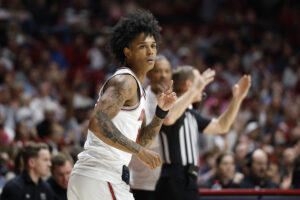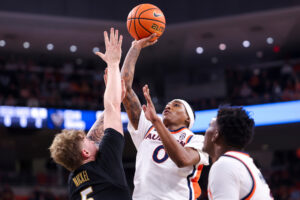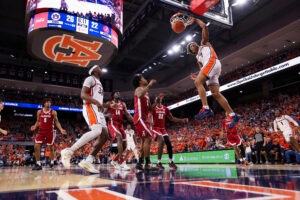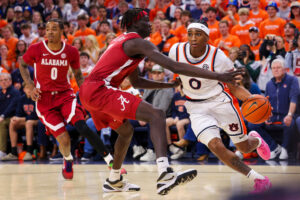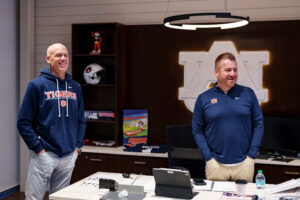He’s survived an earthquake, a fire, and plenty of rain, and he’s still going strong. Hoover native and 14-year MLB veteran Jeff Brantley reflects on a career that has taken him all over the country—and brought him back home again.
It sounded like a train coming. Step by step, the sound grew louder and louder.
The year was 1989 and San Francisco Giants pitchers Jeff Brantley and Mike LaCoss were walking through a tunnel that led from the locker room to the field at Candlestick Park in San Francisco. It was 5:04 p.m. when they heard the sound of the Loma Prieta earthquake that rocked the stadium just before Game 3 of the 1989 World Series against the Oakland A’s.
When the earthquake hit, the emergency lights went out and the two Giants pitchers blindly negotiated the concrete wall of the tunnel with their bare hands. Instinctively, Brantley stuffed his glove underneath his right arm and tucked it in—protecting the gift that had gotten him to the Big Leagues—and began to jog in the direction of daylight.
But the ground was moving beneath them.
“The tunnel began to turn, almost like if you went to a fair ride,” Brantley remembers. “You could tell it was turning, because it was throwing us off balance.”
By the time they arrived in the dugout, the earthquake had stopped, and an eerie silence fell upon the stadium. Astonished by the turn of events and concerned that the park might collapse, many of the players—including Brantley himself—searched the stands for their families and sought safe haven at second base. Some could not find their loved ones and feared they might be dead.
Brantley hadn’t noticed, but when he looked down, he discovered blood all over his pants. “My left hand was bleeding from holding on to the concrete cinder block wall and running. It had just shaved the skin off of my fingertips,” he says.
As the panic calmed down, fans, unaware of the extent of bedlam in the Bay area, chanted for the game to continue. The Giants were down 0-2 in the Series, and baseball had to go on. What they didn’t realize was that nearby, the Bay Bridge had collapsed, the Nimitz freeway had imploded, and a marina was on fire. In the end, sixty-three people were killed and over three thousand were injured by the earthquake that measured 6.9 on the Richter Scale.
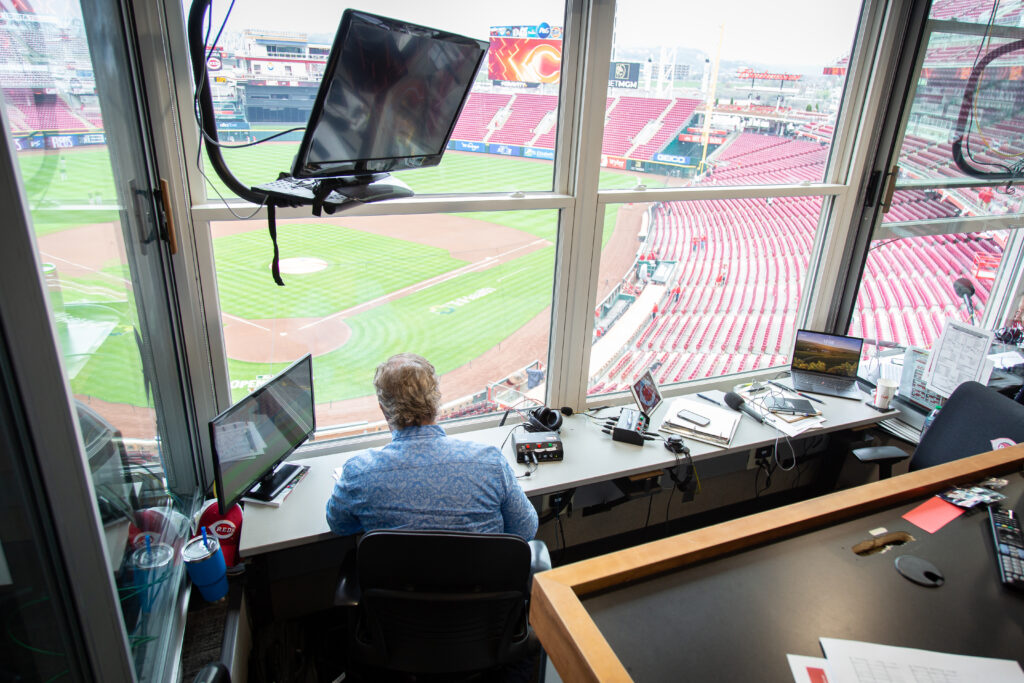
Ten days later, the Series resumed. Brantley came on in relief in Game 3, pitching 2.2 innings and surrendering one run in a 13-7 loss. Oakland—a team loaded with an armory of bashers like Jose Canseco, Mark McGwire, and Rickey Henderson—would close the Series out the next night and spoil Brantley’s chances of becoming a World Series champion.
Despite the setback, Brantley knew he’d come a long way from the high school pitching mounds of Jefferson County, Alabama, and, Lord willin’, had a long career in front of him.
Southern Baseball
Like many kids who grew up in Alabama at the time, twelve-year-old Jeff Brantley was obsessed with the game of baseball. If he was not playing in the Dixie Youth or Dizzy Dean leagues, he was adjusting his radio dial to listen to the Cincinnati Reds broadcasts and the dynamic voice of the franchise, Marty Brennaman, pumping through the airwaves. Brantley had fallen in love with “The Big Red Machine” dynasty that captured back-to-back World Series titles in 1975 and ’76 with the likes of Pete Rose, Johnny Bench, and Joe Morgan, but he also dreamed of one day sitting in Brennaman’s place as the Reds broadcaster.
As it turned out, tuning in to hear his favorite team wasn’t all that easy. Often, broadcasts from inside the Brantley home were scratchy, making it difficult to hear Brennaman’s voice or the diamond exploits of Mr. Rose & Company. But one day while young Jeff and his father were driving around town, something magical happened.
“I flipped (the broadcast) on in the car and it was crystal clear,” Brantley says. “So, we get home and I go inside and turn it on—nothing. We go back in the car and we turn the game back on and we are moving the car up and down, back and forth in the driveway. And I’m listening to Marty Brennaman and Joe Nuxhall. I’m sure the neighbors thought we were nuts.”
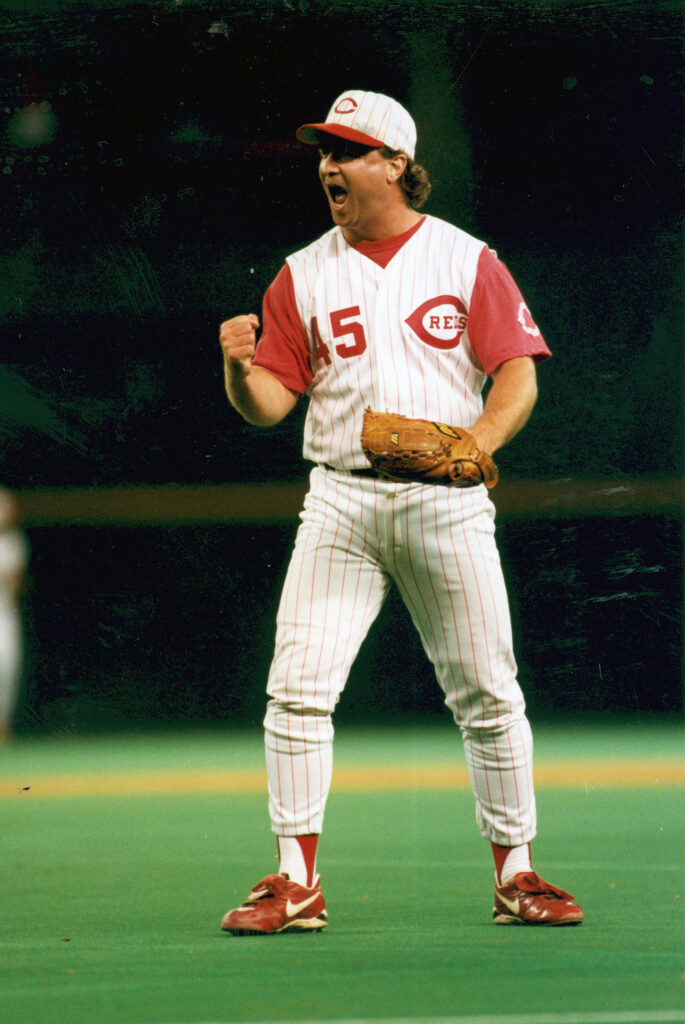
Brantley lettered in three sports at Berry High School (now Hoover High School): playing quarterback for the football team, pitching for the baseball team, and wrestling in the 132 lb. class. One day, while Brantley was playing baseball across town against rival Mountain Brook, an umpire by the name of Lindsay Tenant took notice of the young hurler and asked if he might be interested in checking out a place called Mississippi State. Years earlier, Brantley had become acclimated with MSU during a Dixie Youth World Series event held in nearby Columbus, Mississippi. On a day off, Brantley’s coach took his players to Starkville to tour Dudy Noble field, home of the Mississippi State Bulldogs. Brantley so revered the grass of the field that he took off his shoes to walk around on it, and as the team was enjoying their tour, a man showed up, puffing on a cigar.
“What are you boys doing?” the man inquired. He then proceeded to pack the boys in a van and take them on a campus tour.
That man’s name? Ron Polk, head coach of the Mississippi State Bulldogs.
Brantley pitched for Polk from 1982-85, amassing an SEC-record 45 wins and helping his team to a berth in the 1985 College World Series.
While at MSU, Brantley played alongside future MLB stars and Mississippi State legends Will Clark, Rafael Palmeiro, and Bobby Thigpen, but he is quick to credit the lesser-known stars – players like Gene Morgan, Frank Davis, John Scott, and Dan Van Cleve—for their contributions to the Bulldogs’ success.
From 1985-88, Brantley slogged it out in the minor leagues and worked at a trucking company called Consolidated Freightways to make ends meet. Eventually the majors would come a-calling, as Brantley was called up by San Francisco to make his major league debut on August 5, 1988.

MLB Career
It was Atlanta. Out of all the cities in the National League for Brantley to make his MLB debut, the hand of Providence led him to the mound for the first time in the Southern city of Atlanta—just 150 miles from where he grew up in Hoover. That night, Brantley doled out 62 tickets for friends and family, hoping he would enter a game for the first time against the hometown Braves. His hunch was correct.
Late in the game with San Francisco trailing, Giants manager Roger Craig called down to the bullpen in Fulton County Stadium and said to get Brantley up and loose. As the reliever charged in and took the mound, a scowl descended upon his face. But just before he was about to throw his first major league pitch, he heard a familiar voice from the stands yelling, “Come on, Jeffrey!”
“My mom screams it out over everybody,” Brantley laughs. “Nobody calls me Jeffrey. I had to step off the mound because I went from this major league tough guy to this little five-year-old boy.”
Brantley regrouped and faced his first batter, Andres Thomas, the Braves shortstop. Thomas got ahead in the count, but when a nervous Brantley zipped a 3-0 fastball right down Broadway and Thomas promptly lined out to shortstop, the young pitcher thought to himself, Wow, is it this easy?
He then proceeded to have a little postgame chat with his mom.
Across six seasons in San Francisco, Brantley establish himself as a trustworthy reliever. His earned run average (ERA) from 1990 to 1992 was a meager 2.33 and he collected 41 saves during that span. He was rewarded for his pitching prowess by being selected to the 1990 All-Star Game at Wrigley Field in Chicago, where he shared the field with future Hall-of-Famers Wade Boggs, Ken Griffey Jr., Barry Larkin, and Cal Ripken, Jr., among others.
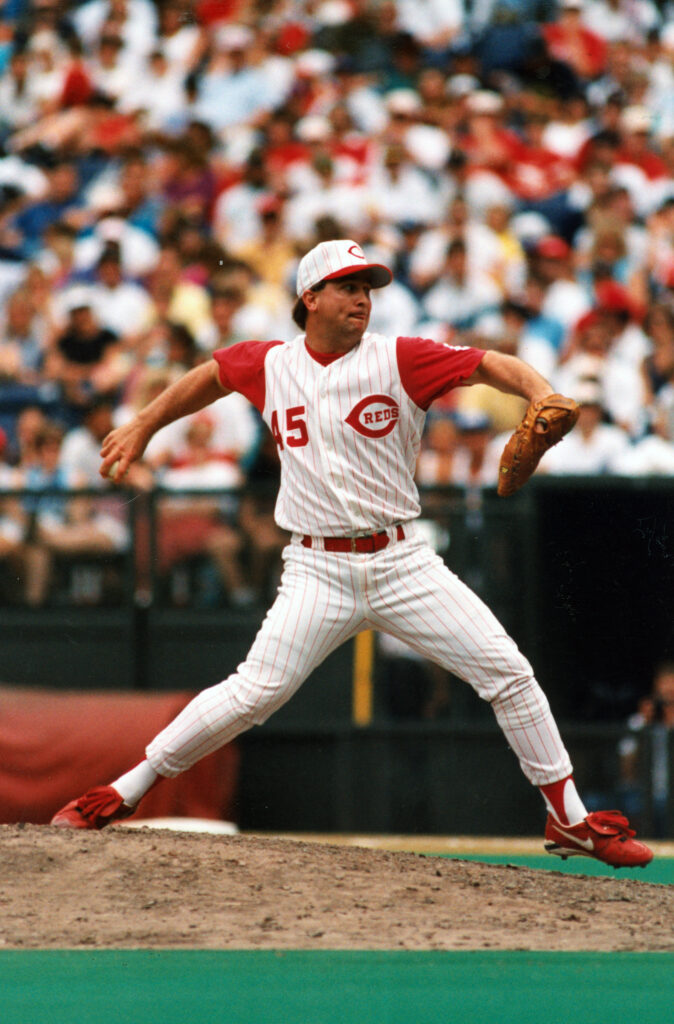
Brantley became a free agent after the 1993 season and signed with his beloved childhood team, the Reds, on January 4, 1994. He would have some of the best years of his career in Cincinnati during the mid-1990s, his ERA hovering in the twos while establishing himself as a bona fide closer. Brantley set a career-high of 44 saves in 1996 and was named the NL Rolaids “Relief Pitcher of the Year,” attributing much of his success to the Reds’ pitching coaches, who helped him broaden his repertoire.
“When I got to Cincinnati, I knew right away I wanted coaches Don Gullett and Grant Jackson to teach me a shorter breaking ball,” Brantley remembers. “And I can remember going down to the bullpen over and over with Grant Jackson…and we were trying to tighten it up where it would be more slider, less curve ball. So, when I picked up that short slider, it made me a wholly different pitcher.”
His time in Cincinnati would be relatively short-lived, however, as Brantley was traded to St. Louis in exchange for Dmitri Young on November 10, 1997. After one season with the Cardinals, he was then traded to Philadelphia, where he regained his form and posted a 23-save campaign in 2000.
The following season, he signed a free agent contract with the Texas Rangers but was unable to recreate the success he’d had in years prior. After being released by the Rangers that May, Brantley announced his retirement from baseball.
The Alabama native had had a long, productive career in which he’d won monumental battles against superstars like Barry Bonds, Eddie Murray, Dave Parker, and Tony Gwynn. But sometimes, he found himself on the losing end of an encounter, like the time he faced Jeff Bagwell at Candlestick Park in San Francisco. Brantley relates the story:
In the first 17 at-bats against Jeff Bagwell, I either struck him out or popped him up. You get to a point where you know when a guy steps to the plate, he’s mine…well, he comes to the plate in San Francisco—boom, just like normal. I had him down in the count 0-2 and I’m thinking, ‘alright, this guy’s going down.’ I throw a fastball up and in and it knocked him down. He gets back into the box and he looks out there and looked at me. I thought to myself, ‘Don’t look at me like that’ and I threw another one up and in. That was the worst move I could have made because all that did was make him mad. And the next pitch, he hit it to dead center…and it landed back in that abyss where you thought, ‘oh my gosh, balls don’t go back there.’ I didn’t get him out for probably another five years.
There would be other obstacles along the way. Just when Brantley was turning to a new chapter after his playing career, he would face the toughest season of his life.
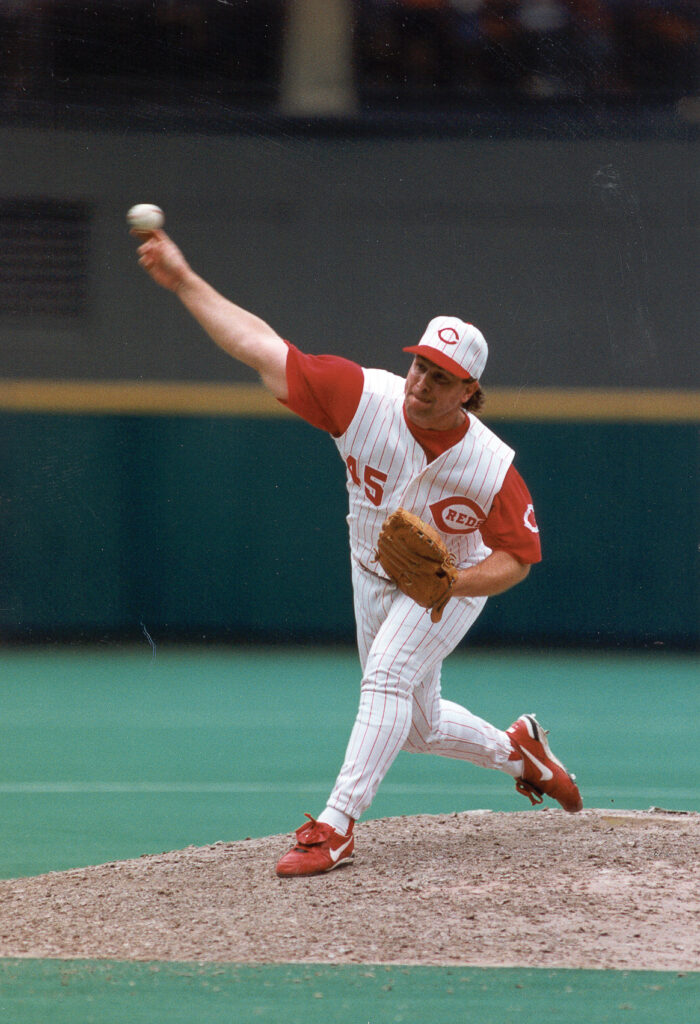
Through the Fire
Brantley stayed in baseball. In 2001, the recent retiree joined ESPN as an in-game and studio analyst for the show Baseball Tonight. At the time, he and his then-wife were raising two young children, Emily and Murphy, and building their dream home back in Mississippi. Although it took years to build, Jeff figured it would be the last home he’d ever live in and had plans to settle down there forever. But then the first signs of trouble began to occur.
Jeff and his wife ended up getting a divorce and while the two were negotiating the terms of the dissolution, the house burned to the ground. Around the same time, Jeff lost his dad to a sudden heart attack that was a complication of a blood disorder he’d been battling for some time.
“I was just shellshocked,” Brantley says. “Never in my wildest imagination did I think I would lose him at that particular time.”
During his major league career, Brantley had become an expert at getting his team out of trouble when the bases were loaded and his team had no wiggle room. Now the bases were loaded in his personal life.
Brantley says he initially attempted to get out of the jam by coping in unhealthy ways, but eventually settled down and called on relief from above. “You try to soothe the pain, and whatever method of soothing that pain you try to look for that’s not in God’s direction is a major mistake,” Brantley says. “The best method I have found—at least in my life—is that God’s gonna put us in a place. We’ve just gotta trust Him as we walk to that place. That’s never easy to do, especially when you’re going through heartache or pain or embarrassment or whatever the issue may be.”
While his life was in turmoil, Brantley made sure he smiled for the national cameras and broke down MLB games like a champ. According to him, working at ESPN was a nonstop, fast-paced environment that employees coined “The Washing Machine” because they were constantly bouncing from one place to the next. And though he was commenting on the game he knew and loved, Brantley had downshifted into survival mode. Baseball helped him regain his footing and realize what was deeply important in life.
“The one constant I’ve always had in my life besides the Lord is that baseball has come second nature to me. I was something I could put my time into and my emotions and strength into, and work my way back into better health, not only mentally for myself, but also my faith in God,” he said.
Though working for ESPN for several years was certainly a thrill, Brantley would experience a homecoming of sorts in 2006 when he joined a familiar voice that had been ringing in his mind since his childhood days in Birmingham.
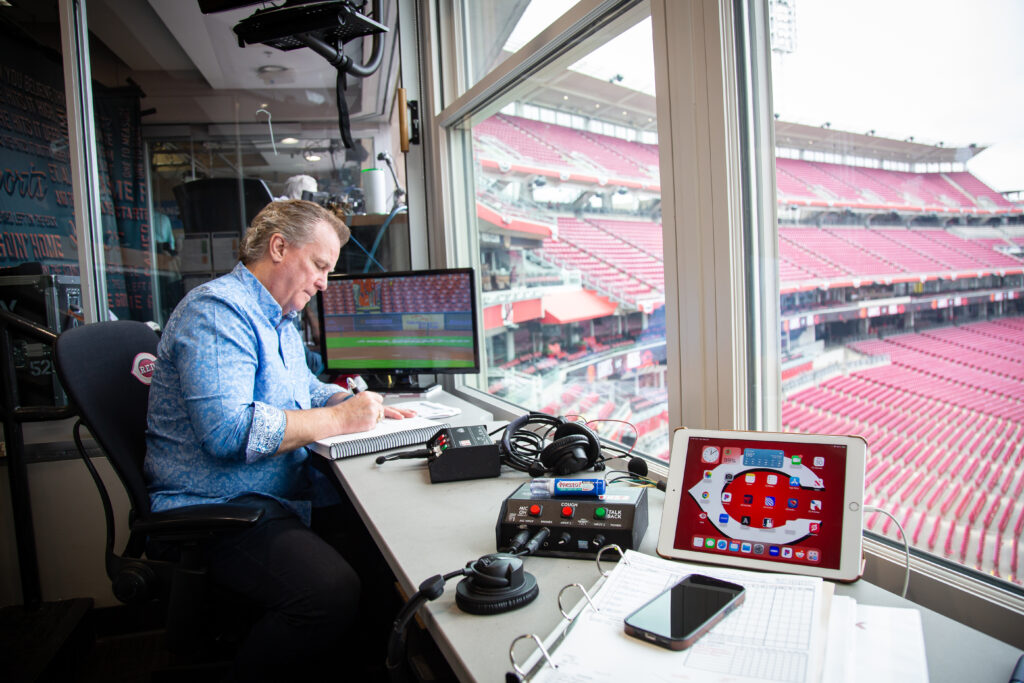
Broadcaster
Marty Brennaman was one of the first people Jeff Brantley called when Reds owner Bob Castellini extended the invitation to return to Cincinnati—this time as a broadcaster. Brantley had gotten to know his childhood idol while playing for the Reds and respected the veteran’s opinion on whether he would be a capable sit-in for ailing announcer Joe Nuxhall. Brennaman’s assent gave Brantley a sense of comfort that it was the right move.
“Having the opportunity to go back to Cincinnati really put me in a position where I felt like I was just going home,” Brantley says. “It’s kinda like you’re going back to your mama, you’re going back to home cooking, you’re going back to your own pillow, your own bed. And that’s how I have always viewed Cincinnati. It was just a real good feeling.”
Brantley easily slipped into the role of analyst, but in their first spring training together, Brennaman puzzled his new partner with a question. “(Marty) said, ‘Jeff, have you been practicing your play-by-play?’” Brantley recalls. “I’m like, ‘No…I can do that in my sleep. I’ve been doing that since I was nine.’ Little did I know that play-by-play is a whole different animal.”
Brantley’s Trial-by-Brennaman would arrive sooner rather than later. In the second inning of a game early in the season, Brennaman handed over the play-by-play radio duties to Brantley, got up, and walked out of the booth. Unfortunately, the inning was not an easy 1-2-3 as Brantley had anticipated. There was a walk, a wild pitch, and a gapper by a right-hand hitter that scored a run. Just as Brantley is chopping down the batter’s swing with his typical astute analysis, he felt the hot breath of a colleague on his shoulder: “Tell ‘em where the ball is!! Where’s the ball??” the voice implored.
It was Brennaman, screaming at him through his loudest whisper.
Brantley hadn’t realized that the role of the play-by-play announcer is to paint a picture and set the scene in the listeners’ minds. Amid all the confusion, he’d forgotten that cardinal rule. “And that, by itself, was a learning experience,” Brantley says. “Kinda like that bicycle when your daddy let’s go of it and you’re going down the hill…’you got it, Son?’”
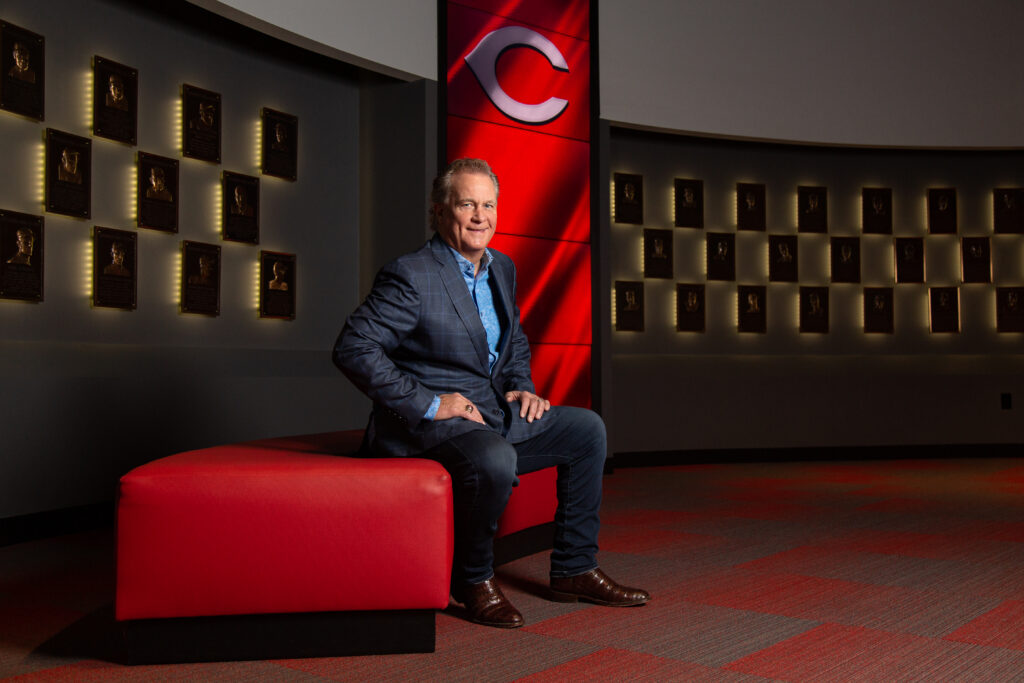
Brantley would eventually steady the handlebars and become a beloved broadcaster for a franchise that has as rabid a radio following as any in Major League Baseball. Today, Brantley handles radio duties when the Reds are at Great American Ball Park in Cincinnati, and switches to TV when the Reds travel on the road (he says his favorite away venue is Wrigley Field and his favorite city to visit is Chicago – try Joe’s restaurant if you happen to be in town).
Brantley is known affectionately around the ballpark and on the airwaves as “Cowboy”—a moniker that is derived from his propensity to favor cowboy boots as his footwear of choice—and works alongside a talented broadcasting team that includes Tommy Thrall, Chris Welsh, John Sadak, Jim Day, Brian Giesenschlag, Sam LeCure, Annie Sabo, and Barry Larkin. There is a camaraderie among these professionals and one can be sure that there’s never a dull moment if Cowboy is in the building.
Though he’s endured a few slumps along the way, life is good for the former reliever-turned broadcaster, who recently celebrated 20 years of marriage to his wife, Ashley. In addition to two children from his previous marriage, Jeff and Ashley have two children of their own, Elizabeth and Mason.
Brantley splits time between Madison, Mississippi, and Cincinnati, and frequently goes home to Hoover to visit his mom, who is now in her mid-eighties. Almost forty years removed from his MLB debut, Brantley admits their relationship is great and yes, she still calls him Jeffery.
Like those heroes of old, Jeffrey Hoke Brantley has learned that no matter how rough the terrain, a true cowboy always saddles up and rides again. It doesn’t take but a brief encounter with the Reds broadcaster to sense a depth, a peace, and a kindness about him that likely would not exist had he not been placed under extreme struggle and pressure throughout his life. Brantley is a deep man who openly talks about his Christian faith and is quick to credit the Lord for helping him to endure trials, which, across 61 years, have come in the form of earthquakes, fires, death, and divorce.
Through it all, he has learned to tune into the crystal-clear voice from above and to trust in the one who made the earth quake with his bloody hands as he was nailed upon a cross.
And one who guides wayward souls from the dark tunnel of despair into light. TG
Editor’s Note: Brantley was recently selected to the Class of 2026 of the Alabama Sports Hall of Fame.



